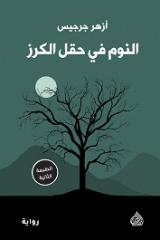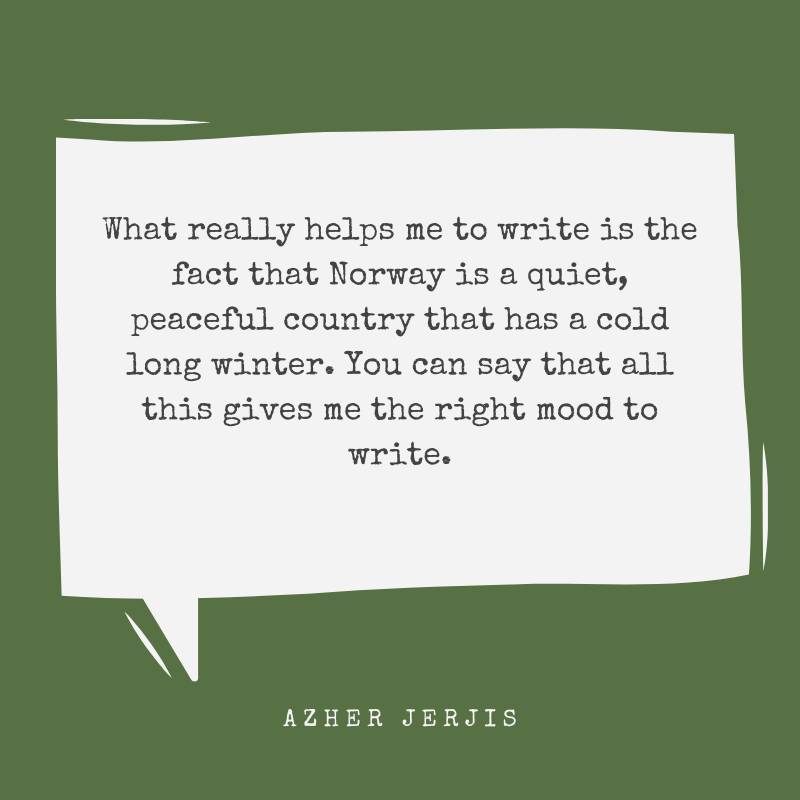Iraqi author Azher Jirjees was born in Baghdad and began working as a journalist in 2003. In 2005, his life took a sharp turn when he published his satirical Terrorism…Earthly Hell:
Reception of the book led to an assassination attempt, and Azher Jerjis fled Iraq. He went to Norway — via Syria and Morocco — and published two satiric short-story collections, Above the Country of Blackness (2015) and The Sweetmaker (2017).
His first novel, Sleeping in the Cherry Field, came out last year, and it tells the story of an Iraqi postman working in Oslo who writes satiric short stories, but who is crushed by the death of his beloved Tuna Janssen. An urgent letter recalls him from his grief-stricken isolation to Baghdad, where he is kidnapped by an armed militia.
Jirjees’s debut novel was longlisted for the 2020 International Prize for Arabic Fiction, and is currently working on a new novel that, he says, he hopes to finish by the end of 2020. He shared a few thoughts about Sleeping in the Cherry Field with Tugrul Mende.
Tugrul Mende: Sleeping in the Cherry Field is one of the few novels on the International Prize for Arabic Fiction longlist that takes place in the present. What led you to write this novel?
Azher Jirjees: Since my arrival in Europe, I’d started to write stories of immigrants and published many of them, but I felt that everything I wrote and published was not enough. I felt it was necessary to write a novel that could tell about the suffering of a person in his homeland and in exile. I was obsessed with the novel until the day came when I saw a migrant working as a postman in my city. He wore thick woolen clothes, a thick cap, and he was sad and depressed. I later learned that he was an Iraqi immigrant, and that all his family members had been killed by a bomb in Baghdad, forcing him to flee war and migrate to Europe. But he remained sad and lonely, despite the safety he had enjoyed in this country. His story had a huge effect on me and inspired me deeply. I found myself writing the novel.
TM: The story takes place in Norway; how much of you can we find in the narrative?
AJ: One of the difficult things for an author is to determine what and how much is to be leaked from his autobiography to the narrative text he writes. We just need to face it; the author cannot prevent this leak. Indeed, some authors insert parts of their autobiography into their narrative text, making the matter confusing for the reader. I think it is legitimate, but I didn´t follow that path. Yes, there is a similarity between me and the protagonist of my novel, Saeed Jensen. We are both Iraqi immigrants who live in Norway, and we are both write satirical stories, but our lives are completely different.
TM: What obstacles did you face while writing Sleeping in the Cherry Field?
AJ: I had some difficulties while writing Sleeping in the Cherry Field. The most important obstacle I faced was obtaining accurate information about the mass graves in Iraq. I could not find a published official documentary source, or accurate official statistics, which compelled me to travel there and search myself. There was also a problem about the terrorist operations and bombings that took place in Baghdad. I know a lot about all this, but I had to watch a lot of videos on the internet, which caused me great sorrow and depression.
TM: In what way did you write “Sleeping in the Cherry Field” differently from your short-story collections?
AJ: In short stories I used sarcasm in my writing, and I made fun of paradoxes in the texts, which made critics describe them as black comedies. It was mostly imaginative fiction. As for Sleeping in a Cherry Field, I consider it as a realistic fictional narrative. It is a novel that tells about the life of a migrant worker who works as a postman in Norway, suffers from delusions, and there’s nothing in his life he is able to call fun. In writing the novel, I had to do some research to obtain information and statistics. This did not happen when writing short-story collections.
TM: What authors are you currently reading?
AJ: Mark Manson (The Subtle Art of Not Giving a F*ck).
TM: How is Sleeping in the Cherry Field a work about you being away from home?
AJ: As a writer, I consider having the chance to live in different countries as a tremendous opportunity, a huge gift. Being held to one place, like a tree holding to its roots, will not give a person various possibilities to have quite a real deep understanding of the world we live in. I am fortunately not like the tree. I have been to more than one country and I have seen a lot. The events of the novel that I wrote in Norway include both Norway and Iraq as the setting.
I have to confess that spending the early part of my life in my homeland, Iraq, and the last more than ten years in Norway, has given me more confidence to choose to have these two countries in my novel. I feel I know these two countries quite well. I know how immigrants live in Norway, and all the details around their lives; what kind of neighborhood they live in, their everyday lives, issues that draw their attention, and so on. What really helps me to write is the fact that Norway is a quiet, peaceful country that has a cold long winter. You can say that all this gives me the right mood to write. I feel that I am surrounded by what it is needed to write, the beautiful nature, the calmness and quietness, the warmth of the house in winter, and my imagination, all gathered help me to write.
Tugrul Mende holds an M.A. in Arabic Studies from the University of Leipzig. He is based in Berlin as an project coordinator and independent researcher.
Click HERE to read more from this author.
You can publish this article on your website as long as you provide a link back to this page.




Be the first to comment